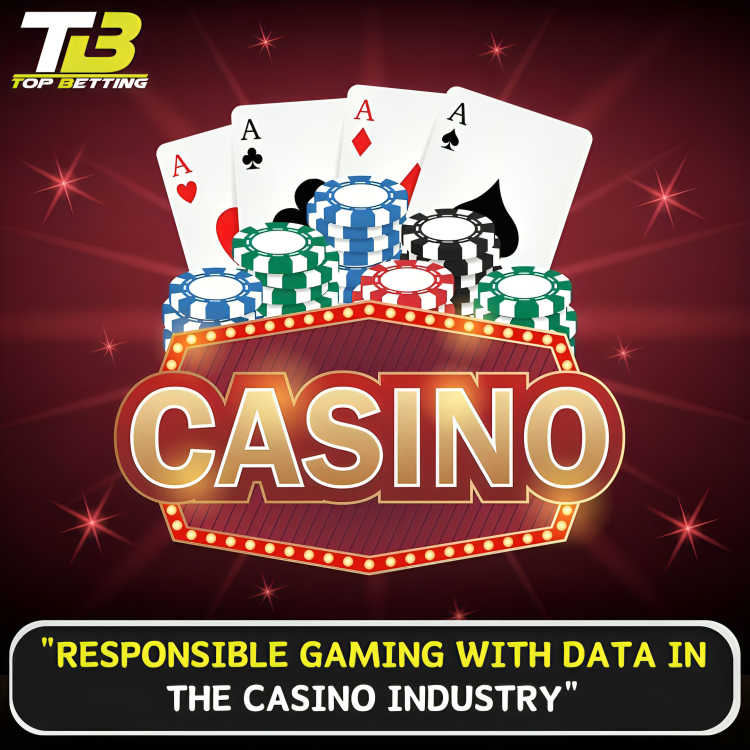
Responsible Gaming with Data in the Casino
Welcome to a world where responsible gaming meets data in the casino industry. In this fast-paced and ever-evolving landscape, casinos are taking a proactive approach to ensure a safe and enjoyable gambling experience for their customers. By harnessing the power of data, they are able to implement effective strategies that promote responsible gaming habits and minimize potential risks.
The casino industry is no stranger to the use of data. From customer preferences to playing behavior, casinos games have access to a wealth of information that can shape their operations. But now, they are leveraging this data to go beyond profitability and prioritize player well-being. Responsible gaming initiatives are being developed with the aim of identifying problem gambling behaviors early on and intervening to provide support and resources for those in need.
Data-driven responsible gaming is not only beneficial for players, but also for casinos themselves. By promoting a safe and responsible gambling environment, casinos can enhance their reputation, build trust with customers, and ultimately increase customer loyalty and satisfaction.
In the dynamic landscape of the casino industry, responsible gaming stands as a cornersto
ne principle aimed at safeguarding players and fostering a healthy gambling environment. With the advent of advanced technologies and data analytics, casinos are leveraging data-driven approaches to enhance their responsible gaming initiatives. This essay explores the intersection of responsible gaming and data analytics within the casino industry, delving into the ways in which data is utilized to promote player welfare, identify at-risk individuals, and mitigate the harms associated with problem gambling.
Understanding Responsible Gaming:
Responsible gaming encompasses a range of strategies and practices aimed at mitigating the risks associated with gambling and promoting safe and enjoyable gaming experiences. It involves proactive measures to prevent problem gambling, protect vulnerable individuals, and ensure that gambling remains a form of entertainment rather than a source of harm. Key components of responsible gaming include player education, self-exclusion programs, setting limits on gambling expenditure, and offering support services for individuals experiencing gambling-related difficulties.
The Role of Data in Promoting Responsible Gaming:
Data analytics has emerged as a powerful tool for promoting responsible gaming within the casino industry. By harnessing the vast amounts of data generated through player interactions, casinos can gain valuable insights into player behavior, identify patterns of problematic gambling, and tailor interventions to address individual needs. Here are some key ways in which data is utilized to promote responsible gaming:
Player Tracking and Behavioral Analysis:
Modern casinos employ sophisticated systems to track player activity and analyze behavioral patterns. Through the use of player loyalty cards, mobile apps, and online platforms, casinos collect data on various aspects of player behavior, including frequency of visits, duration of play, betting patterns, and preferred games. By analyzing this data, casinos can identify players who may be exhibiting signs of problem gambling and intervene proactively to offer support and assistance.
Predictive Modeling and Risk Assessment:

Data analytics enables casinos to develop predictive models that assess the likelihood of an individual developing gambling-related harm. By analyzing historical data and identifying risk factors associated with problem gambling, casinos can assign risk scores to players and implement targeted interventions. These interventions may include personalized messages, self-exclusion options, or referrals to support services. By identifying individuals at higher risk of developing gambling problems, casinos can intervene early and prevent the escalation of harm.
Real-Time Monitoring and Alerts:
Casinos utilize real-time monitoring systems to track player behavior as it occurs. These systems can detect deviations from normal gambling patterns, such as sudden increases in betting activity or extended periods of continuous play. When anomalies are detected, casinos can issue alerts to staff members trained in responsible gaming interventions, who can then engage with the player and offer assistance as needed. Real-time monitoring allows casinos to identify and address potential issues promptly, reducing the likelihood of harm to players.
Gamification and Behavioral Nudges:
Data-driven gamification techniques are employed to encourage responsible gaming behavior among players. For example, casinos may offer rewards or incentives to players who adhere to pre-set limits on their gambling expenditure or take regular breaks during gameplay. By incorporating behavioral nudges into the gaming experience, casinos can promote self-regulation and reduce the likelihood of excessive gambling. Gamification techniques leverage the principles of behavioral psychology to encourage positive gaming habits and empower players to make informed decisions about their gambling behavior.
Challenges and Ethical Considerations:
While data analytics holds tremendous potential for promoting responsible gaming, it also presents certain challenges and ethical considerations. One concern is the privacy and security of player data, as casinos must ensure that sensitive information is handled responsibly and protected from unauthorized access. Additionally, there is a risk of algorithmic bias, where predictive models may inadvertently discriminate against certain groups or individuals based on factors such as age, gender, or socioeconomic status. It is essential for casinos to adopt transparent and ethical data practices, prioritize player welfare, and involve stakeholders in the development of responsible gaming initiatives.
The Importance of Responsible Gaming
Responsible gaming is a crucial aspect of the casino industry that focuses on creating a safe and secure environment for players. It involves promoting responsible behavior, preventing problem gambling, and providing support for those who need it. The consequences of irresponsible gambling can be devastating, both for individuals and their families. By prioritizing responsible gaming, the industry aims to protect players from harm and ensure a positive gambling experience for everyone involved.
Understanding the Casino Industry
The casino industry is a dynamic and highly competitive sector that offers a wide range of gambling activities to its customers. From traditional casino games to online platforms, the industry caters to diverse preferences and interests. Casinos generate revenue through the house edge, which is the statistical advantage they have over players. This profit is used to cover operational costs, invest in infrastructure, and support responsible gaming initiatives.
The Impact of Data in the Casino Industry
Data plays a significant role in shaping the casino industry. Casinos collect vast amounts of data on customer behavior, preferences, and spending patterns. This data is analyzed to gain insights into player habits, identify potential risks, and personalize the gambling experience. By leveraging data, casinos can make informed decisions, optimize their operations, and develop targeted responsible gaming strategies.
Responsible Gaming Initiatives in the Casino Industry

Responsible gaming initiatives are designed to promote safe and responsible gambling behaviors. These initiatives aim to prevent problem gambling, provide support and resources to those in need, and raise awareness about the potential risks associated with gambling. Casinos collaborate with organizations and regulators to develop responsible gaming programs, implement self-exclusion policies, and provide educational materials to their customers.
Implementing Data-Driven Responsible Gaming Practices
Data-driven responsible gaming practices involve leveraging data analytics and technology to identify and address potential gambling-related issues. By analyzing player data, casinos can detect patterns of problematic behavior and intervene proactively. This may include personalized communication, setting limits on gambling activities, and providing access to support services. Data-driven responsible gaming practices empower casinos to take a proactive approach in protecting their customers.
Tools and Technologies for Responsible Gaming
The advancement of technology has opened up new possibilities for responsible gaming. Casinos utilize various tools and technologies to promote responsible gambling practices. This includes player tracking systems, artificial intelligence algorithms, and data analytics platforms. These technologies enable casinos to monitor player behavior, identify red flags, and intervene when necessary.
The Role of Regulators in Promoting Responsible Gaming
Regulators play a crucial role in promoting responsible gaming within the casino industry. They enforce regulations, set standards, and ensure that casinos adhere to responsible gaming practices. Regulators work closely with casinos to develop policies and guidelines that prioritize player protection and well-being. By holding casinos accountable, regulators create an environment that fosters responsible gambling.
Case Studies of Successful Responsible Gaming Programs
Several casinos have implemented successful responsible gaming programs that have had a positive impact on both players and the industry. These programs utilize data analysis and technology to identify problem gambling behaviors and provide support. For example, a casino might use player tracking systems to identify individuals who are spending excessive amounts of time or money on gambling and offer them resources for assistance. Such programs demonstrate the effectiveness of data-driven responsible gaming strategies.
The Future of Responsible Gaming in the Casino Industry
The future of responsible gaming in the casino industry is promising. With advancements in technology and data analytics, casinos will have even more tools at their disposal to promote responsible gambling practices. The industry will continue to innovate and develop strategies that prioritize player well-being. Additionally, collaborations between casinos, regulators, and organizations will further enhance responsible gaming initiatives and ensure a safer gambling environment for all.
Conclusion

Responsible gaming with data is transforming the casino industry. By leveraging data analytics and technology, casinos can implement effective strategies to promote responsible gambling habits and prioritize player well-being. The industry recognizes the importance of creating a safe and enjoyable gambling experience for its customers. Responsible gaming initiatives not only benefit players but also contribute to the long-term success and sustainability of the casino industry. As technology continues to advance, the future of responsible gaming looks promising, with data playing a pivotal role in shaping the industry’s approach to player protection. So, let’s embrace responsible gaming with data and create a safer and more enjoyable gambling environment for all.











